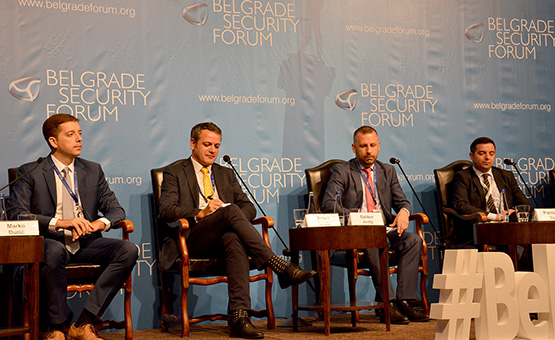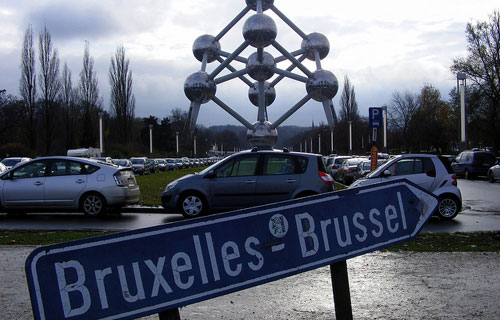Djurić: Belgrade does not have a partner for the implementation of reached agreements in Priština
The Director of the Office for Kosovo and Metohija, Marko Djurić, repeated today at the Belgrade Security Forum panel that Serbia is fully committed to solving the great, generational problem through dialogue and peaceful means, but that Belgrade has no partner in Priština for the implementation of reached agreements.

He said that many agreements have been made over the past period, but that Priština has abolished the position of the official in charge of implementation in its administration.
“We haven’t had a partner for dialogue and implementation for months. We are hanging in the air and we depend on their will to name someone who will deal with this”, Djurić said.
At the moderator’s remark that this does not have to be a problem, because even “America does not have a minister for culture, but they still have culture”, Djurić said:
“Kosovo and Metohija is not America”.
He pointed out that, while searching for the solution, it is time to start taking into account what the Albanians and Serbs in Kosovo and Metohija want.
“I am not sure that in previous years, we took this into account for Serbs and Albanians equally, at the time of former Yugoslavia Serbs were certainly not consulted, and such bad practice exists even today”, he said.
He also pointed out that for Serbs, Kosovo and Metohija is an autonomous province, and for the Albanians and a part of the world it is an independent state, but he adds that the population of Kosovo and Metohija is not satisfied with the status and that a large number of Albanians wants to be part of a different state organization, for example the so-called Great Albania, while Serbs want Kosovo and Metohija to remain a part of Serbia.
“A small number is happy with the current situation”, he believes, adding that the socio-economic situation is very hard.
Answering the moderator’s question on what is normality for him in Kosovo and Metohija, he said a better economy, more jobs, and lower unemployment rate.
“We are ready to work with Priština on these goals, because both sides benefit from it. Normality means not dealing with the status, but conditions for a better life of common people”, Djurić said.
He also notes that he is not sure that Albanians’ wishes end with the declaration of independence, and as an example stated that Albania appointed three officials in its administration that are from Kosovo and Metohija, also that the so-called Kosovo President Hashim Thaci said all Albanians should get passports of Albania.
“This clearly indicates that even the highest officials of the Priština administration are not satisfied with their status, just like the citizens”, he added.
While commenting on the reconstruction of the bridge in Mitrovica, he agrees that this should be done in a mutually acceptable way, but emphasizes that the bridge for Serbs is a symbol of fear, since a large number of incidents and attacks on them came from across the bridge, in previous years.
He also pointed out the failure of Priština to enable the return of expelled Serbs.
Even Arben Gashi, MP in the Kosovo Assembly from the Democratic Party of Kosovo, agrees that changes are needed for normality to happen, adding that changes are needed so we can have a future.
However, he says, we need constructiveness, not destructiveness in our approach.
“We need a relaxation of relations and more interlocutors like Dalibor Jevtić (also a panel participant, member of the Serbian List)”.
However, he remarked that one thing that doesn’t contribute to this is when Djurić says “Kosovo and Metohija” when speaking of Kosovo, because, as Gashi says, Kosovo has an official name, and he asked what would happen if he said “Pashalik of Belgrade”, “Sanjak of Smederevo”…
Responding to this remark, Djurić explained that for Serbs, Kosovo and Metohija is more a geographical term, and it has specific cultural and historical significance for the Serbian people.
In addition, he added that when he comes to Belgrade, Gashi can call it Belgrade or pashalik or however it pleases him, and this is his first time here and as he said he likes it, but Djurić noticed:
“I cannot say such a thing in Priština, because for the last six months I couldn’t even go there”.
In that sense, he said that if we talk about what our conditions for normality are, that should arise from what our societies think, both the Albanian and Serbian communities.
He pledged for a more intense dialogue, especially after the majority of citizens in Kosovo and Metohija in June elections voted for the leaders who were war commanders in 1999, and he noted that this means the degree of nationalism is still very high, even though the international community has invested a lot in the civilian sector.
“This means we need to continue even more intensely with the dialogue, but also to consider the fears of both Serbs and Albanians. The situation is not good at all. The situation on the field is very sensitive and we must be accountable and lead the communities towards reconciliation and not towards conflict”, Djurić said.
According to him, the call of the President of Serbia to internal dialogue will gather the nation in order to solve the problem in peaceful manner, that is, to reach a lasting solution for Serbs and Albanians, not only in Kosovo and Metohija, but in the whole region.
When asked by the moderator if this means Belgrade does not have a vision of what should happen at the end of this dialogue, Djurić said:
“Belgrade has a vision. But that should not be a vision of a group of politicians or an administration, but the whole society, so that neither Serbs nor Albanians are the ultimate losers”.
It is not enough to say today to just give Kosovo and Metohija, but an adult and mature discussion is necessary on what can realistically be achieved.
The Deputy of the provincial Prime Minister, Dalibor Jevtić, said that it is necessary to point out the reality, when it comes to the normalization of relations, and that it is not the same for every part of Kosovo and Metohija.
Serbs living in the southern part are faced daily with different problems and this must be taken into account when it comes to normalization.
“We need more solutions, and less politics. I was in Velika Hoča yesterday and we didn’t talk about politics there, but about tourism and economy. That is their interest, to find a chance for them to sell their products”, Jevtić said.
Speaking about the return of Serbs to Kosovo and Metohija, Jevtić pointed out that Bogdan Mitrović’s arrest sent the wrong message, adding that this has to change.
“Bogdan Mitrović was arrested only because he wanted to visit his house in Suva Reka. That is a very bad message for all people wishing to return. If we wish to reach the “normalization” point, we must eliminate such messages. Many Albanians with whom I have spoken share my views”, he said.
The main message he sent was that life should be put above politics.
Former Deputy Minister for EU Integrations of so-called Kosovo, Ramadan Ilazi, assessed as positive that there still exists a commitment to the region, and noted that a new phase in the dialogue between Belgrade and Priština is being announced.
He said that the dialogue brought many important agreements, adding that EU support is good and that more direct communication between leaders in needed.
Gordana Čomić (DS) says that in 2017 we have an internal dialogue, and points out that this is just a name, because we are not starting from the beginning, as some think.
She adds that there should be a permanent dialogue in the institutions.
Furthermore, Djurić pointed out to the imbalance when it comes to conditions made by the EU.
As he said, in the process of European integration, Serbia has Chapter 35 (on Kosovo and Metohija) and everything else depends on it, while Priština does not have any conditions regarding CSM for the visa liberalization process.
“That is an apparent imbalance”, he said.
Upon answering to one of the panelists on customs and borders, he said that Belgrade wants a freer flow of goods and people.
“We neither want nor need customs services, but a unique customs region. We are for abolishing all types of controls that block the free flow of goods and people”, Djurić said.
He also rates that the new provincial government began co-operating with Serbs in a more optimistic tone that before.
Asked if the Government of Serbia has another partner among Serbs in Kosovo and Metohija, besides the Serbian List, Djurić said in his opinion Serbs in Kosovo and Metohija can achieve more only if they act together.
“My personal opinion is that this is a matter of survival for them; to unite and to have a common representative in the institutions where they represent the minority. And the Serbian List should be more inclusive”, he said.


